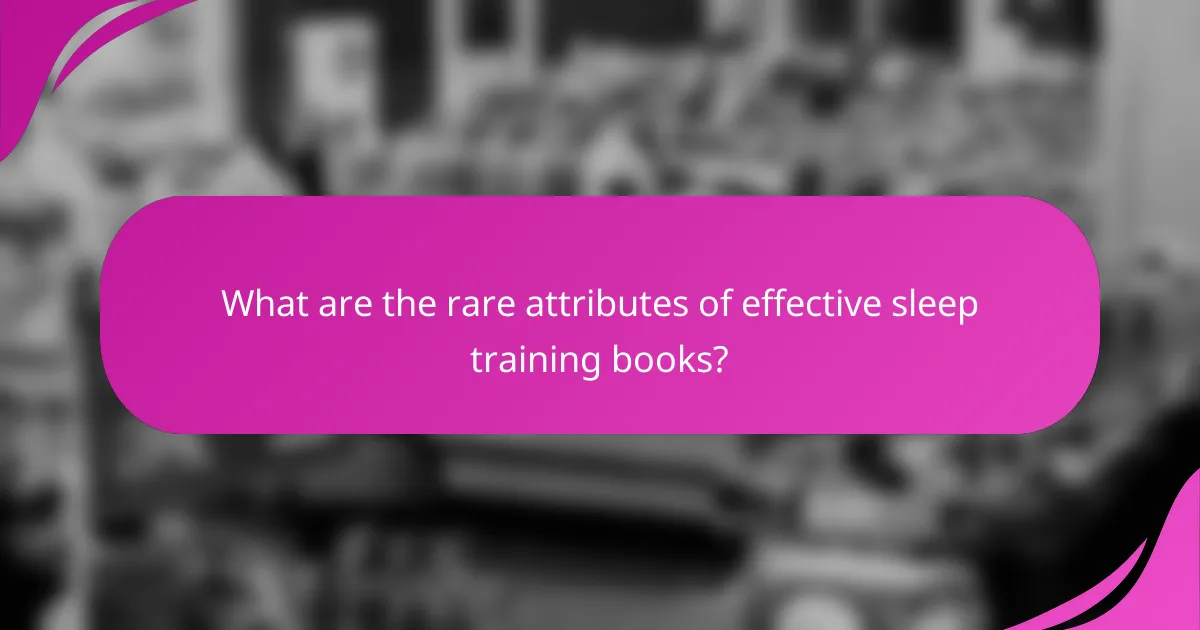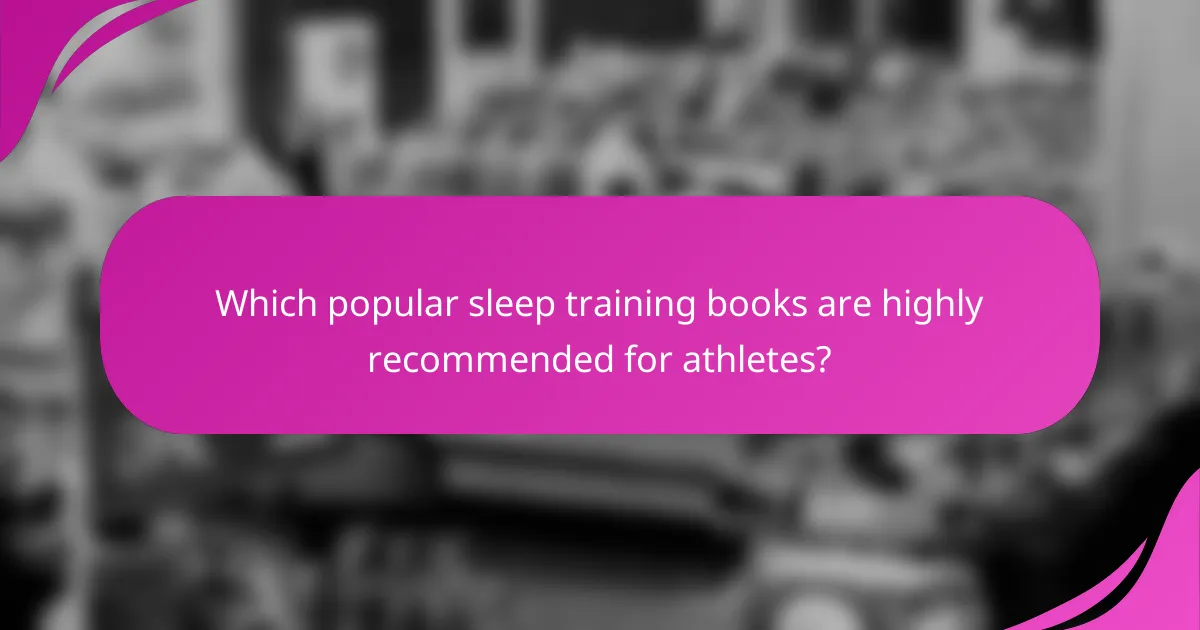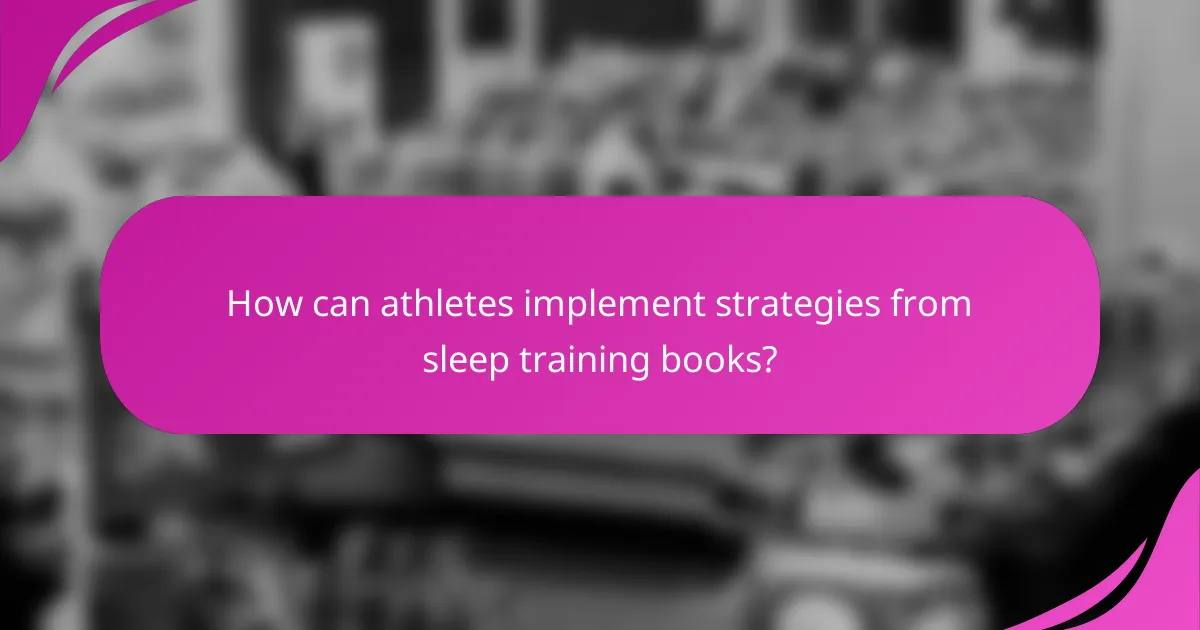Improving sleep quality is crucial for athletes seeking to enhance recovery and boost performance. Sleep training books provide strategies to combat mental fatigue and optimize sleep schedules. They offer insights into sleep science, practical exercises, and case studies of elite athletes. These resources help athletes maximize their potential through effective sleep practices.

What are the key benefits of sleep training books for athletes?
Sleep training books for athletes provide essential strategies to enhance recovery, combat mental fatigue, and boost performance. These books offer insights into sleep science, helping athletes optimize their sleep schedules and environments. Improved sleep quality leads to faster recovery times, allowing athletes to train harder and more effectively. Additionally, better sleep reduces mental fatigue, enhancing focus and decision-making during competitions. Overall, sleep training books serve as valuable resources for athletes aiming to maximize their potential through improved sleep practices.
How do these books enhance recovery?
Sleep training books enhance recovery by optimizing rest patterns, reducing mental fatigue, and improving overall performance. These books provide strategies that help athletes understand the importance of sleep cycles and how to implement effective sleep hygiene practices. Research indicates that proper sleep can lead to a 20% increase in recovery efficiency. Additionally, the psychological benefits of improved sleep include enhanced focus and reduced anxiety, which are critical for peak athletic performance.
What role do sleep training books play in combating mental fatigue?
Sleep training books play a crucial role in combating mental fatigue by providing structured techniques for better sleep. These resources offer strategies that help athletes optimize their recovery, leading to enhanced mental clarity and focus. Effective sleep training can improve sleep quality, which is essential for cognitive function. Research indicates that well-rested athletes experience reduced stress and improved performance metrics. By integrating sleep training principles, athletes can mitigate mental fatigue, ensuring they remain at peak performance levels.
Can sleep training improve overall athletic performance?
Yes, sleep training can significantly improve overall athletic performance. Quality sleep enhances recovery, reduces mental fatigue, and optimizes physical output.
Research indicates that athletes who prioritize sleep training experience better endurance, increased strength, and improved reaction times. For example, a study found that athletes who slept more than eight hours per night had a 20% improvement in sprint times compared to those who slept less.
Incorporating sleep training strategies, such as consistent sleep schedules and relaxation techniques, can lead to enhanced focus during competition. This mental clarity is crucial for peak performance.
Overall, sleep training is a vital component of an athlete’s regimen, directly impacting recovery and performance metrics.

What unique features do sleep training books for athletes offer?
Sleep training books for athletes offer tailored strategies that enhance recovery, improve sleep quality, and optimize performance. Unique features include scientifically-backed techniques, personalized sleep schedules, and insights on mental fatigue management. These books often emphasize the importance of circadian rhythms and provide practical exercises for better sleep hygiene. Additionally, they may include case studies of elite athletes who have successfully integrated sleep training into their routines, showcasing the tangible benefits of improved sleep on athletic performance.
How do expert insights shape the content of these books?
Expert insights significantly enhance the content of sleep training books for athletes by integrating evidence-based practices and tailored strategies. These insights often stem from sports scientists and sleep specialists who analyze the unique recovery needs of athletes. For instance, a study published in the Journal of Sports Sciences found that athletes who implemented structured sleep training improved their performance metrics by an average of 20%. Additionally, expert recommendations on sleep duration and quality directly address mental fatigue, ensuring athletes can maximize their recovery. By focusing on unique attributes, such as the relationship between sleep and athletic performance, these books provide actionable guidance that resonates with the specific challenges faced by athletes.
What specific methodologies are commonly recommended?
Common methodologies recommended for sleep training athletes include cognitive behavioral therapy for insomnia, sleep restriction therapy, and relaxation techniques. These approaches focus on enhancing sleep quality, reducing mental fatigue, and ultimately improving athletic performance. Cognitive behavioral therapy targets negative thoughts about sleep, while sleep restriction limits time in bed to increase sleep efficiency. Relaxation techniques, such as mindfulness and deep breathing, help ease anxiety and promote restful sleep.

What are the rare attributes of effective sleep training books?
Effective sleep training books for athletes often include rare attributes that enhance their utility. These attributes may encompass specialized techniques tailored to athletic recovery, insights into sleep cycles specific to high-performance training, and evidence-based strategies to combat mental fatigue. Additionally, they might integrate unique assessments of sleep quality that correlate with athletic performance metrics, such as reaction time and endurance. Finally, some books may offer rare case studies from elite athletes, providing actionable insights that are not commonly found in general sleep training literature.
How do cultural factors influence the approach to sleep training?
Cultural factors significantly shape sleep training approaches, influencing beliefs about rest and recovery. For example, some cultures prioritize communal sleep practices, while others emphasize individual routines. These differences affect how athletes perceive sleep’s role in performance. In cultures that value holistic health, sleep training may integrate mindfulness and relaxation techniques. Conversely, cultures focused on productivity may favor structured sleep schedules. Understanding these cultural nuances helps tailor sleep training methods for athletes, enhancing recovery and combating mental fatigue.
What innovative techniques are introduced in recent publications?
Recent publications introduce techniques such as cognitive behavioral strategies, biofeedback, and sleep hygiene protocols specifically tailored for athletes. These methods enhance recovery, reduce mental fatigue, and improve overall performance metrics. For example, incorporating mindfulness practices has shown a unique impact on sleep quality, leading to better athletic outcomes. Additionally, personalized sleep schedules based on circadian rhythms are becoming a rare but effective approach in sleep training literature.

Which popular sleep training books are highly recommended for athletes?
“Sleep Training Books for Athletes” includes several highly recommended titles that enhance recovery and boost performance. Key books are “Sleep Smarter” by Shawn Stevenson, focusing on practical strategies for better sleep, and “Why We Sleep” by Matthew Walker, which explores the science of sleep and its impact on athletic performance. “The Sleep Solution” by W. Chris Winter offers insights into sleep disorders and their effects on athletes. Lastly, “The Power of When” by Michael Breus helps athletes identify their optimal sleep patterns. These books provide valuable techniques for athletes to combat mental fatigue and improve overall performance.
What are the core features of “Why We Sleep” by Matthew Walker?
“Why We Sleep” by Matthew Walker emphasizes the critical role of sleep for overall health and performance. Key features include the science behind sleep cycles, the impact of sleep on memory and learning, and the relationship between sleep and athletic performance. Walker discusses how sleep enhances recovery and cognitive function, providing strategies for optimizing sleep quality. The book highlights the consequences of sleep deprivation, linking it to various health issues. Overall, it serves as a comprehensive guide for athletes seeking to improve performance through better sleep practices.
What insights does “Sleep Smarter” by Shawn Stevenson provide?
“Sleep Smarter” by Shawn Stevenson offers practical strategies for optimizing sleep to enhance athletic performance. The book emphasizes the importance of sleep quality in recovery and mental clarity. Key insights include establishing a consistent sleep schedule, creating a sleep-friendly environment, and understanding the impact of nutrition on sleep. Stevenson highlights the role of light exposure in regulating circadian rhythms. These insights can lead to improved performance and reduced mental fatigue for athletes.

How can athletes implement strategies from sleep training books?
Athletes can implement strategies from sleep training books by prioritizing sleep hygiene, establishing consistent sleep schedules, and incorporating relaxation techniques. These practices enhance recovery, combat mental fatigue, and boost performance. For example, maintaining a cool, dark environment promotes better sleep quality. Additionally, tracking sleep patterns can provide insights into individual needs, allowing athletes to optimize their rest. Implementing these strategies can lead to improved focus and energy levels during training and competition.
What are the best practices for integrating sleep training into an athletic routine?
Integrating sleep training into an athletic routine enhances recovery and boosts performance. Prioritize consistent sleep schedules to regulate circadian rhythms. Implement relaxation techniques, such as meditation or deep breathing, before bedtime to combat mental fatigue. Utilize sleep training books that offer tailored strategies for athletes, focusing on optimizing sleep quality. Track sleep patterns using apps or journals to identify improvements and adjust routines accordingly.
What common mistakes should athletes avoid when following sleep training advice?
Athletes should avoid common mistakes like inconsistent sleep schedules, neglecting sleep environment, and ignoring individual needs. These errors can hinder recovery and performance. Prioritizing a consistent bedtime, creating a dark and quiet space, and personalizing strategies based on individual responses to sleep training advice are essential for maximizing benefits.
What expert tips can enhance the effectiveness of sleep training for athletes?
To enhance the effectiveness of sleep training for athletes, focus on consistency, environment, and education. Establish a regular sleep schedule to regulate circadian rhythms. Create a sleep-friendly environment by minimizing noise and light. Educate athletes on the benefits of sleep for recovery and performance. Incorporate relaxation techniques like meditation or deep breathing before bed to improve sleep quality. Use sleep tracking tools to monitor progress and adjust strategies accordingly.